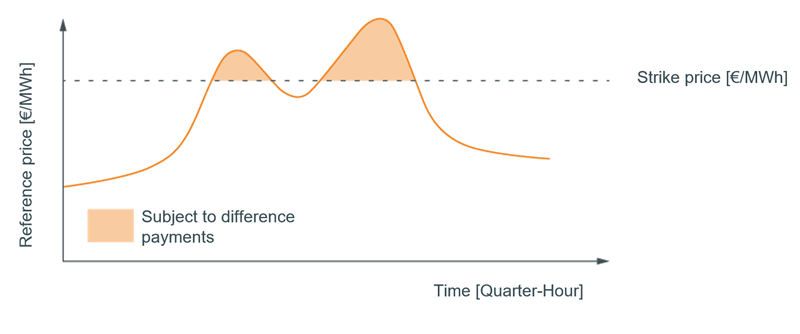CRM Remuneration, Availability and Payback
Be available at adequacy-relevant moments, collect remuneration and pay back if day ahead electricity price exceeds the strike price
After the pre-delivery period, the delivery period starts from 1 November in year Y until 31 October in Y+1.

During the Delivery Period contracted Capacity Market Units (CMU) will be remunerated while fulfilling their obligations:
- Remuneration: Elia pays out the remuneration, equalling the accepted bid level times the contracted MW, in monthly instances.
- Availability obligation: In exchange for the capacity remuneration, you commit to make your capacity available during adequacy-relevant moments. This is checked via two mechanisms: Availability Monitoring and Availability Testing.
- Payback obligation: When the electricity price goes above a set threshold known as the strike price, the difference between the day-ahead price and the strike price must be reimbursed. This mechanism prevents windfall profits, and the total amount repaid can never be higher than the remuneration received by a CMU.
Note that CMUs can trade capacity obligations on the Secondary Market. This allows CMUs to sell their excess capacity or to cover their capacity shortages and most transactions are expected during the delivery period. More information is provided below under ‘Secondary Market’.
Availability and Payback Obligation
In exchange for the capacity remuneration, the CMU commits to the obligations defined in the Capacity Contract, i.e. the Availability Obligations and the Payback Obligations. Checking the availability is done via two mechanisms: Availability Monitoring and Availability Testing. Availability Monitoring takes place regularly, while availability Tests are exceptional interventions for cases where there is doubt about a CMU’s actual availability. An overview is provided below:
Availability Monitoring
Availability Monitoring is the primary method Elia uses to verify that CMUs are available during periods relevant for security of supply. These periods are triggered when the Belgian Day-Ahead price exceeds a pre-defined price threshold, the Availability Monitoring Trigger or AMT Price. Consequently, the periods during which the AMT Price is exceeded are called the AMT Moments.
Monitoring is conducted using centrally collected data to ensure reliability and fairness. During each AMT Moment, Elia checks all CMUs to confirm they are available to provide their committed capacity.
Based on the amount of capacity that was contracted in the Auction, an Obligated Capacity is established that reflects the amount of capacity the CMU is expected to contribute. This is compared to the Available Capacity, the amount of capacity that Elia has actually observed. The calculation of the Obligated Capacity and Available Capacity can vary in function of the characteristics of the CMU.
If a CMU’s Available Capacity falls short of its obligation, penalties can be applied. Persistent shortfalls and repeated breaches can lead to escalated penalties or even contract termination, underlining the importance of consistent availability throughout the delivery period.
More information can be found in the quick reference card below.
Availability Testing
While Elia regularly monitors all Capacity Providers to ensure they are ready to deliver electricity when needed, monitoring alone does not always give the full picture. Some units, especially those with flexible or less predictable schedules may not be required to deliver during AMT Moments. This means their actual availability cannot always be demonstrated through normal monitoring.
To address this, Elia uses Availability Testing. This involves sending a surprise signal to selected providers one day in advance, asking them to make their capacity available for delivery the next day.
CMUs are chosen for these tests based on factors, such as if they previously failed availability tests and if they have shown low availability in earlier monitoring. More information can be found in the quick reference card below.
Payback Obligation
The CRM is designed as a reliability option, meaning that Capacity Providers receive a Capacity Remuneration but are obliged to payback money to society whenever the reference energy spot price (day-ahead price) exceeds a pre-defined strike price.
This Strike Price is defined in the Ministerial Decree on “Volume and Parameters”, and can also be found on the calibration page.
There is an actualization mechanism in place that adapts the Strike Price in function of recent energy prices. In addition, the Strike Price is recalculated every year.

Calibrated Strike Price
For all upcoming auctions, DSM and energy storage units are exempted from the payback obligation.
More information can be found in the quick reference card below:
Remuneration
During the delivery period of the CRM, a CMU receives monthly payments, provided they comply with certain obligations, such as the Availability Obligation and the Payback Obligation.
As the auction operates under a Pay-As-Bid principle, selected CMUs are paid according to their own Bid Price. This remuneration is paid at the end of each month during the Delivery Period (see settlement below). Penalties for not fulfilling the Availability Obligation, as well as any amounts due under the Payback Obligation, are settled separately and must be paid by the Capacity Provider at a later stage.
The base remuneration, calculated before the application of any penalties or the payback obligation, is determined as follows:
Remuneration [y]=Bid Price [Eur/MW/y]*Contracted Capacity [MW]
Note that the remuneration is not indexed between the Auction and the Delivery Period.
Providers continue to receive these payments as long as they meet their obligations, such as passing regular availability checks and responding to tests or calls from Elia. If a unit is unavailable when needed, penalties can apply, and repeated issues can lead to further consequences, including possible termination of the contract.
Settlement
The Settlement of the Capacity Remuneration occurs in two steps in accordance with the modalities in the Capacity Contract:
- The Capacity Provider provides an ex-ante invoice for Month M to Elia covering the Capacity Remuneration.
- Elia then issues a monthly delivery activity report (covering the Unavailability Penalties and Payback Obligation) to the Capacity Provider. The monthly delivery activity report also corrects the Capacity Remuneration from the ex-ante invoice for ex-post Secondary Market transactions. Based on the monthly statement received from Elia, the Capacity Provider issues a credit note or invoice.
Finally, a contestation procedure can apply in case of disagreement between Elia and the Capacity Provider.
Please refer to the quick reference card on Settlement below, the Functioning Rules and the Capacity Contract for more information.
Secondary Market
The Secondary Market is a key feature of the CRM, designed to offer Capacity Providers flexibility and help keep overall CRM costs down. Through the Secondary Market, Capacity Providers can transfer their contracted obligations to other Prequalified CMUs.
This option offers higher granularity in contract durations, from as short as 15 minutes up to one year. A Secondary Market Transaction can be notified at any moment of year at the exception of timing related to a Transaction Period covering an Auction period.
Which volumes can participate to the Secondary Market
To determine which volumes are available on the Secondary Market for a buyer, Elia applies the principle that all volumes which have already been accounted for towards Security of Supply (SoS) in Belgium at the moment of the Auction cannot be traded anymore.
All other volumes, which have not been considered as contributing to SoS can be used to acquire capacity on the Secondary Market, these include:
- Opt-out volumes which have been classified as OUT (not contributing to Adequacy) during the Prequalification Process.
- Volume of CMUs which were not selected in the Auction.
Who can take over your CRM obligations
In order to facilitate transactions on the Secondary Market and in accordance with the CRM Functioning Rules, Elia publishes the contact details of the Prequalified CMUs.
More information on the Secondary Market can be found in the quick reference card below.
How to get a view on the remuneration and obligations during the delivery period?
Details about settlement and the Availability and Payback Obligation for your specific CMUs will also be accessible in the CRM IT interface


